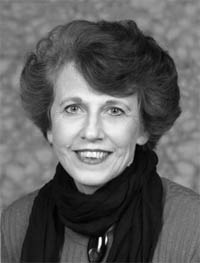Karen Bogenschneider – “Universities as Honest Knowledge Brokers: The Case Study of the Family Impact Seminars”

Karen Bogenschneider, Ph.D., Human Development & Family Studies, University of Wisconsin-Madison
Families are the cornerstone for raising productive workers in a sound economy and responsible citizens in a strong democracy. Yet many families today are struggling. Public policy provides the conditions for families to deal with stressful conditions: the inability to find a job, afford health insurance, secure quality child care, or send their kids to good schools. Yet public policy is not working as well as it could for families. Most Americans would agree that policymaking is less effective and more polarized than it should be. But it doesn’t have to be that way. Policymaking could be better if it were based on rigorous research and dispassionate analysis. Unfortunately, a substantial disconnect exists between the production of research and its utilization. My passion is using research to build better public policy for families. I study it, I teach it, and I do it. I direct the award-winning Family Impact Seminars that communicate high-quality, objective research to policymakers.
ASSIGNMENTS: Read Positioning Universities as Honest Knowledge Brokers” pdf here
Required for course credit: Attendance – sign in sheet
Additional Resources:
Positioning Universities as Honest Knowledge Brokers PDF
You are welcome to leave comments about this lecture or topic below. Please note these are moderated – no off-topic or inappropriate comments will be allowed. Please remain respectful. We reserve the right to delete any that are not deemed appropriate.
3 thoughts on “Oct. 9, Karen Bogenschneider”
Comments are closed.
In 2017 The Director of the Nelson Institute said in his talk several times, the Wisconsin Idea is listening. The reading list for the class includes William Cronon’s essay “Only Connect”. Karen described a process and product for connecting the Legislators by starting with them. They defined the topics , Karen created the learning opportunities which included interaction among learners. In the last several years the UW-Madison WEB page included several campus scenes which changed each time you logged on. One of those scenes showed a large tiered lecture hall with students taking notes while a lecturer spoke. The caption below the photo was something like students engage with Shakespare. Karen’s lecture suggested there is interaction among the legislator students during and after the lectures and that is a byproduct of the seminars. Byproducts are things that you don’t expect. On campus or in the community we have an opportunity to make every learning experience connect learners with each other.
A broader comment. I caught the live stream starting about 7:10. As Karen spoke I expected to hear the name of the Wisconsin Legislative Reference Bureau to be mentioned. That body is the research source created by Charles McCarthy and his progressive supporters in 1901. Here is a link to the current Reference Bureau web site concerning it’s research and reference services. https://legis.wisconsin.gov/lrb/library-and-reference/reference/
The Legislative Reference Bureau could be a supporting connection for faculty-legislative interaction.
We have heard this core message from several speakers, repeatedly, over the three years this course has been running. And it is well worth repeating – again and again. The single most important thing we can do to affect change is:
LISTEN!
Just listen.
So many times when we get agitated or disturbed, our instinct is to push. To make sure we are heard. To demand that the other side see our point. Even to yell and demonstrate. We push.
But the way through this crisis – as Karen Bogenschneider advocates – is to passively listen to what the needs are, understand the point of view, bring what we can offer to that table. That’s what gets the other side’s attention. That’s the way to be heard.
In the Family Impact Seminars, the first step was to ask the legislators what they needed. Actually listen to them. And then bring them the data, research, information that filled that need. The first step was in bringing them something they could use. That makes all the difference in an exchange. No heated stubborn arguments – but rather, a peaceful, rational exchange.
But that was only the first step. The second crucial element is to present your information in a way they can understand. As a teacher, this was key in the classroom and was called learning style. You can talk all day to a visual learner and they don’t absorb a thing. But show them a picture and they get it instantly. Dr. Bogenschneider tapped into that teaching element and recognized the politician’s preferred learning style – people-oriented. Brilliant.
That was the most surprising and illuminating thing I learned from this lecture — the key that unlocks a politician:
They are people persons. They don’t want the thick reports – well-researched, with copious details and addendums that academics require. The politician wants the elevator pitch – 30 seconds, cut to the bottom line – but from a PERSON they can trust and have faith in. It is the expert’s expertise they want to tap, and to make sure their expert can be trusted. They don’t have the time to do all the digging themselves, earn their own Ph.D. level on every topic. But they need that level, so need those experts.
Bottom line from this talk, for me, boiled down to how to communicate effectively with our representatives – ask them what they need to know, and then condense any talking points to the Pecha-kucha presentation (20 points in 20 seconds) – but make sure those points are solid and reliable.
Thank you for such a well-thought out and informative presentation. I bet dealing with the representatives honed your style, because it was excellent.